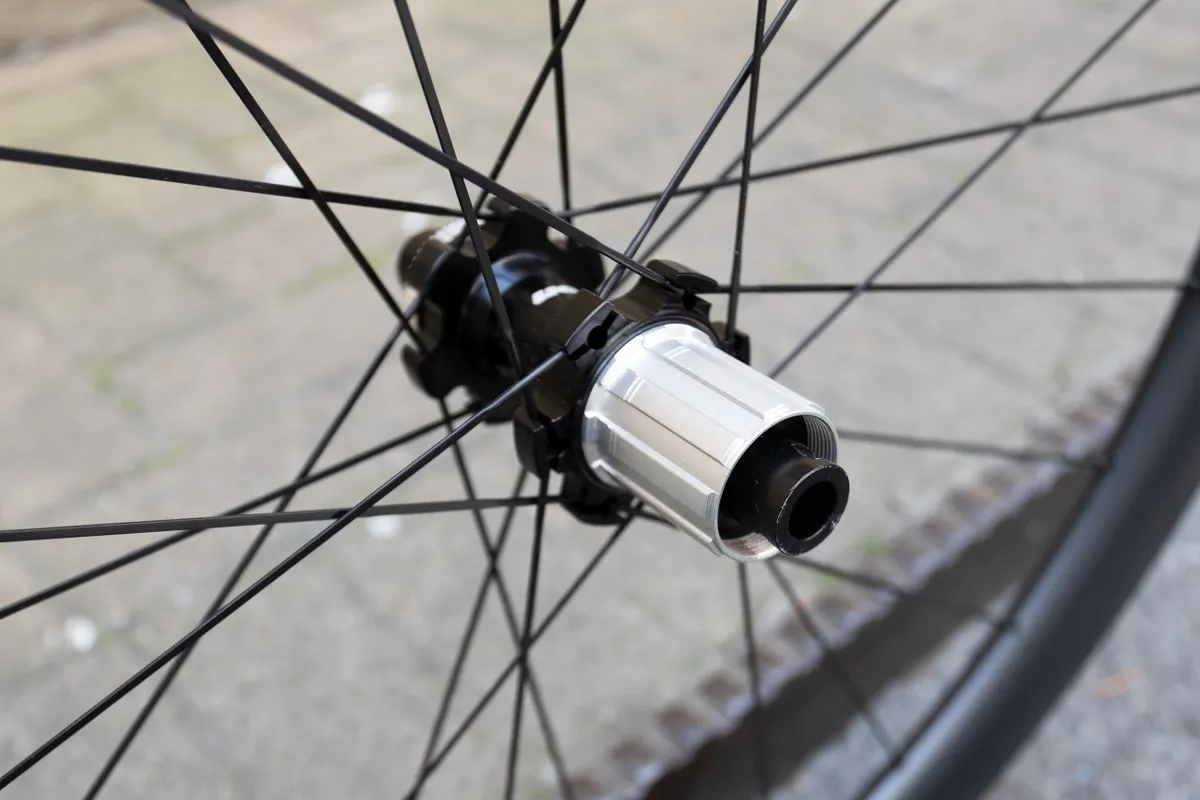As the high-end aftermarket parts wing of FSA, there’s a good chance you’ll have encountered Vision’s parts at some point if you’ve been riding for any length of time.
Vision offers 52 different models of wheel, with the carbon-rimmed ‘SC’ series intended to provide light weight and high performance at a competitive price.
The 55mm iteration is the deepest of three options, each of which is available with Shimano HG or SRAM XDR freehub options.
That puts them firmly in the sights of a rider looking for all-round usability either as a first major upgrade to their bike, or as a more day-to-day wheelset, saving a more extravagant setup for race day.
These wheels could suit anyone from recreational riders who want a bit more performance to time-trialists and triathletes seeking a wheelset to train on.
Vision SC55 DB TLR specification and details

At a depth of 55.3mm, these are more aggressively proportioned than many rival wheels, although they're not the widest at a maximum of 27.2mm. By way of comparison, the VeloElite Carbon Wide 350-50 and Scribe Aero Wide R42 D+ wheels are each 30mm+, while both have shallower depths.
The internal width is 19mm. That's narrower than the most progressive wheels, but it should be remembered that overall rim widths were narrower not all that long ago.
The overall diameter of these rims is 632mm, making tyre replacement easier.
The rim bed is also on the shallower side, measuring 8.2mm. Although that isn’t particularly deep, it won’t make tyre fitment too difficult because the diameter helps so much.
The bead seat on which an inflated tyre sits is just 0.2mm larger than the ETRTO (European Tyre and Rim Technical Organisation) standard 622mm, meaning tyres should seat easily and not require too much of a battle to remove.
The straight-pull spokes are bladed for improved aerodynamics and 24 sit in each wheel, distributed evenly and laced in a two-cross pattern.

The own-brand hubs are compact and don’t have overly intricate machining in which dirt can accumulate.
They’re relatively simple to service too, with no dedicated tools needed to remove the end caps of the front hub.
They are pressed in, so may require pliers or a vice, but once they’re off you have access to the cartridge bearings. The rear hub is a little more involved, requiring two 17mm cone spanners to remove the driveside cap that releases the freehub body.

To remove the other end cap and release the axle requires a 12mm Allen key in the driveside end of the axle, and the same 17mm cone spanner on the non-driveside.
Freehub drive is via 30 teeth offering a 12-degree engagement angle. Those teeth are on the inner edge of a driven ring threaded into the hub body; three pawls in the freehub are sprung by a single circular spring.
Included accessories are thin on the ground, but intriguing. There are spacers to convert both wheels to quick-release axles – including skewers – as well as the front to 15mm bolt-through from the stock 12mm format front and rear.
Although listed as tubeless ready, neither valves nor tubeless tape are included. However, traditional rim tape is used, so tubes can be fitted immediately.
I set the wheels up tubeless to check the ‘TLR’ credentials.
Thanks to the conservative overall diameter, tyres pop on and off more easily than most wheels, which often indicates they won’t seat readily. However, with three different sets of tyres not one gave any trouble.
Vision SC55 DB TLR performance

Out of the box, the front wheel was +/-0.6mm out of true, while the rear measured an upper-end but not unusual +/-0.4mm.
In terms of roundness, there was nothing out of the ordinary, with front and rear showing +/-0.3 and 0.4mm respectively. Spoke-tension variance was a more than respectable 3 per cent in each case.
Once testing was completed, the rear had lost only a tenth of a millimetre at +/-0.4mm trueness and not changed in either roundness or spoke tension. That's impressive, considering some of the roads I subjected it to.
The front wheel was a more complicated story. Trueness and roundness had each dropped a fairly common fifth of a millimetre to +/-0.8 and 0.6mm respectively, and spoke-tension variance had nearly doubled to 5.5 per cent.

Although the wheels had been thrashed around some roads desperately in need of upkeep, there were no specific jarring impacts or crashes, so while the rear returned such good stats it's somewhat unusual to see the front a little worse off.
While trueness and roundness are still well within the +/-2mm parameters, there is no standard surrounding spoke tension. Even so, it’s not unusual to find the cheapest wheels returning variances in excess of 30 per cent, so we’re not discussing terrible figures here.
Being the deepest wheels on test and narrower than some of the competition, I expected the SC55s to be more susceptible to instability in crosswinds and possibly a little twitchy. I wasn’t wrong, but they were far less unnerving than I had anticipated.
Sudden changes in wind conditions elicited a pronounced drift sideways rather than the harsh twitch I was expecting.

As might be expected, it’s easy to maintain a consistent speed once it’s reached. The typical improvement in average speed across rolling terrain is evident as momentum is carried further up gradients and rebuilt faster on descents. This could be quantified on specific stretches of road where velocities at given markers, given consistent entry speed, gearing and conditions, could be compared.
At 1,669g, the Vision wheels aren’t as light as some options, but given their extra depth that’s hardly a surprise. They feel sprightly on climbs well into double-digit gradients and respond well to accelerations everywhere.
Cornering felt a little more lazy than a shallower wheelset, but it’s consistent and predictable, even in blustery conditions.
Vision SC55 DB TLR bottom line
There’s far more to these wheels than their heavy weight and high price.
The SC55s are a good option for someone looking for a slightly deeper set of wheels.
The 55 to 65mm depth is incredibly popular as a useful all-round performance option, and these Vision wheels handle well. They're easy to live with too and could equally well serve as a sole set of wheels or one of a range of options.
How we tested
We’ve assessed seven pairs of road bike wheels around the £1,000 price point over months of gruelling testing.
From varied endurance rides to high-intensity short but hilly blasts, we’ve put these wheelsets through their paces.
Each set of wheels had a list of parameters measured – including trueness, roundness and spoke-tension variance – out of the box, with measurements taken again at 500km.
Wheels on test
Product
| Brand | Vision |
| Price | A$1977.00, €1298.00, £1122.00, $1373.00 |
| Weight | 1669g |
Features
| Rim material | carbon |
| Tubeless compatibility | tubeless_ready |
| Wheel size | 29in_700c |
| Brake type simple | disc |
| Spokes | Straight pull aero bladed |
| Freehub | Shimano HG/SRAM XDR |
| Rim depth | 55.3mm |
| Rim internal width | 19mm |
| Spoke count | 24 |
| Spoke count | 24 |
